Beijing once came close to getting the Texas Legislature to sign off on their drone surveillance of us. Evidence suggests they’re gearing up to try again.
In the 2019 legislative session, two companies tried to push through changes that would have expanded drone usage and the data they can collect, while capping restrictions on both. These efforts were defeated, thanks in no small part to State Rep. Tony Tinderholt (R–Arlington).
Amazon was one of the companies pushing for this. The other was DJI.
What is DJI?
As part of an economic development plan of the Chinese Communist Party, Da Jiang Innovations (DJI) was started and is based in the Guangdong province, the same area where high-security risk company Huawei is based. China Daily, a Chinese Communist Party (CCP) propaganda arm, hailed them as “a startup legend for many young entrepreneurs.”
Theirs is a legend that’s spread.
According to research from the Australian Strategic Policy Institute (ASPI), 80 percent of the drone market in North America, and 70 percent of the global market, is supplied by DJI. But they have also spread into other critical markets as well, offering software for public safety, agriculture, infrastructure, and energy production. At last report, they have more than 14,000 employees and 17 offices around the world, with a Research and Development center in Palo Alto, California. As of October 2020, DJI is worth more than $25 billion.
But there’s more here than just drones, software, and money. ASPI found DJI has substantial CCP ties.
The company’s founder and CEO, Frank Wang, is a member of the Shenzhen Political Consultative Congress. CCP money has also flowed into the company through New Horizon Capital, founded by the son of former Chinese Premier Wen Jiabao, and New China Life Insurance, which is controlled by “state-owned enterprises.”
ASPI also documented that DJI’s true mission is far from drones. Another state-owned business, China Chengtong Holdings Group, said DJI “adheres to the standard of Xi Jinping’s socialism with Chinese characteristics in the new era, and strives to build a world-class high-tech manufacturing enterprise with the standard of ‘walking in the forefront and setting an example.’” Xie Tandi, DJI’s public relations director, said the company would, as it develops technology, “bear in mind the Party and the country’s entrustment.” Also, the Guangdong Work Committee reported DJI had “thoroughly studied and implemented the spirit of the 19th Party Congress.”
The Chinese coronavirus also presented an opportunity for DJI drones to be used to “disinfect public streets and patrol streets” in China.
But their drones do more than is advertised.
Security Threat
A military veteran, Tinderholt told Texas Scorecard why the presence of DJI’s drones are matters of national and state security.
“The Chinese, and other countries, are always collecting data, and what we call that data is EEFI, Essential Elements of Friendly Information,” he said. “It’s things they can collect in the … news, they can collect them by talking to military members, they can collect it by using drones.” He also said they can collect it through direct intelligence by seeing how many of our aircraft are on an airfield, how we purify our water, and the nature of our power grid infrastructure.
Tinderholt explained where the DJI drones fit in. “DJI was asked in an interview ‘Do you ever give the data from these drones to the Chinese government?’ Meaning do you give any of the video footage that’s uploaded to the cloud? And the answer is yes.”
He also said the CCP was caught “dumping” with DJI’s drones. What this means is the company had a $10,000 drone, and the CCP dumped $7,000 into it in order to lower the selling price to $3,000. “The reason they do that is they’re not stupid. They’re smart.”
ASPI chronicled the U.S. government’s countermeasures upon learning of the DJI threat. In 2017, the U.S. Army banned all DJI drone usage, and a year later the U.S. Dept. of Defense banned buying and using “commercial over-the-shelf unmanned aerial systems.” Then the U.S. House crafted a bill banning the purchase of foreign made drones by federal government agencies. Then came the U.S. Dept. of the Interior, in January 2020, stating it was grounding its entire drone fleet except for emergencies. In December 2020 the U.S. Dept. of Commerce put DJI on the government’s list of enemies. Finally, in January 2021, former President Donald Trump made it a priority for China-made drones to be taken out of government service. It was widely reported the Biden Administration was “not expected to diverge substantially” from Trump’s order.
The CCP-connected company responded with a two-fold strategy. First, they decided to produce their new drones in America. Second, they targeted state and local governments as potential buyers. An archive capture of DJI’s website from April 2020 boasts of their success in exporting their drones to 22 states in America, ostensibly as part of their own coronavirus “disaster relief program.”
Their April 2020 infograph confirmed Texas is one of the 22 states.
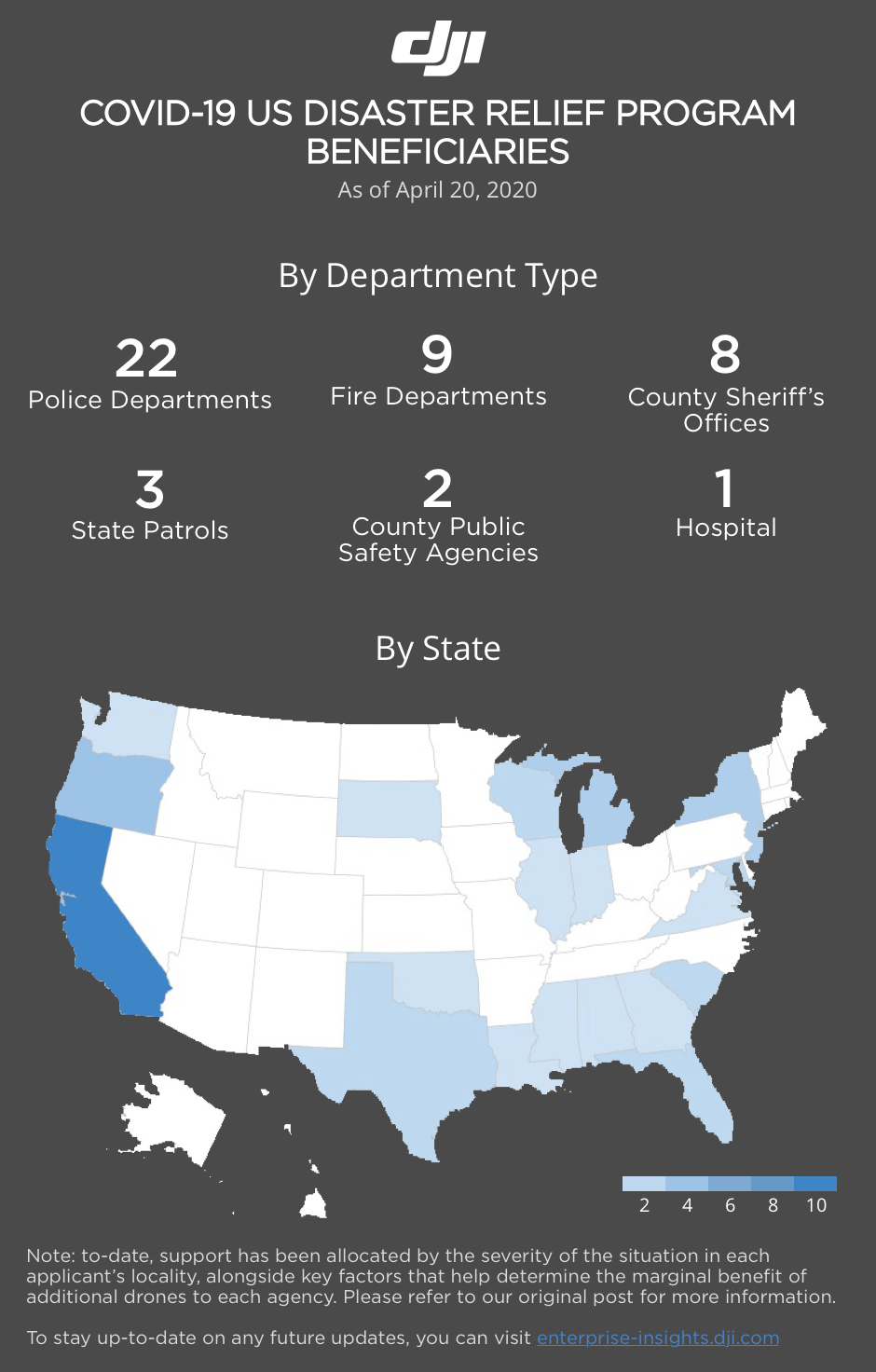
Source: DJI
After learning of this new infiltration operation, in May 2020 several congressional Republicans wrote to the U.S. Dept. of Homeland Security and Dept. of Justice. “On April 1, 2020, DJI donated 100 drones to 45 police, fire, and public safety organizations in 22 states “under the potential guise of helping with the problems caused by the coronavirus pandemic,” the congressmen wrote. They requested information from both departments, including monitoring these drones and federal funding for them.
“We need to make sure law enforcement, National Guard, Air Guard, firefighters, anyone that’s working for the government is not buying, paying for, and using these,” Tinderholt told Texas Scorecard. He also relayed what actions the Texas Legislature should take regarding local governments and DJI drones. “I think we need to probably ban them from buying drones from foreign countries, or drones from companies that are known to have dumping occurring, or that are known to have adversarial involvement with their company.”
As the next state legislative session approaches, Texans will find themselves having to play defense and offense against DJI next year.
CCP in 2023
In the 2019 legislative fight, DJI lobbied up to help push through their goal of widening drone usage, and capping restrictions.
Transparency USA has data on the lobbyists DJI had previously hired: Adam Goldman (2017 – 2020), Amy Beard (2016 – 2017), and Ironclad Partners’ Danner Bethel (2019). Goldman’s (who also has had Google among his clients) DJI pay was in the $250,000 to nearly $500,000 range, Beard’s $75,000 to nearly $150,000, and Bethel’s $50,000 to almost $100,000. Beard also had Google as a client.
Goldman is the brother of State Rep. Craig Goldman (R–Fort Worth). Texas Scorecard made all three lobbyists aware of DJI’s CCP connections and requested comment. No responses were received before publication.
“It’s crazy to me that a Chinese company, so closely aligned with the Communist Party, could even be able to hire a lobbyist in Austin,” Congressman Lance Gooden (R–TX) told Texas Scorecard. “It’s even crazier to me that any American citizen, much less a patriotic one, would even consider taking them on as a client.”
Transparency USA shows another of Bethel’s 2019 clients was the Partnership for a New American Economy Fund. They in turn in that same year had hired Caroline Joyner, who also counted DJI’s pro-drone ally Amazon as a client. While Joyner’s Partnership pay was in the range of $25,000 to nearly $50,000, Amazon’s money blows them out of the water. Since 2015, their contracts with her have been in the range of roughly $287,000 to $575,000.
Amazon did not respond to Texas Scorecard’s inquiry on this before publication.
Amazon and DJI both worked hard in 2019 to get anti-privacy drone legislation passed. That fight was a long, winding, and bipartisan one. It started with State Sen. Judith Zaffirini’s (D–Laredo) Senate Bill 59, which State Sen. Bob Hall (R–Edgewood) ripped into. He added requirements that Amazon and DJI drones only collect images of package placement at the time of delivery, and ensure images collected would be destroyed after a determined amount of time.
The bill died in Senate committee. Then State Rep. (now State Sen.) Drew Springer (R–Muenster) tried to help both Amazon and DJI with his “mother of all drone bills” House Bill 4448. This bill ripped out the Senate’s privacy protections, and added government entities to the list of those who could use drones—giving state agencies, counties, cities, etc. permission to use them for the purposes of “mapping” private property of Texans for a broad range of purposes.
The bill was killed by Tinderholt, only for the issue to be revived again when then-State Rep. John Zerwas’ House Bill 2912 was opened up in order to add language supported by Springer, Amazon, and DJI.
This effort failed as well. But it appears DJI is gearing up for another fight in 2023.
According to information acquired by Transparency USA, for the period of June – December 2022, DJI had “individual prospective contracts” with three lobbyists this election cycle worth somewhere between $0 to more than $56,000. These lobbyists were Brad Schlueter, Stan Schlueter, and Cathy DeWitt. All three are employed at The Schlueter Group, where Stan is the founder.
Data from the Texas Ethics Commission for 2022 lists DJI as a “Prospect” for each of the three.

Source: Texas Ethics Commission
Since 2015, Brad has made anywhere from roughly $366,000 to more than $1.5 million as a lobbyist. Among his clients are private companies such as Medtronic and Red Bull North America, as well as the Jobs for Texas PAC. He is also a taxpayer-funded lobbyist, with the city of Killeen and San Antonio Water System (SWAS) as clients, among others. Those two appear to be his most lucrative contracts.
DeWitt and Stan Schlueter also have lucrative contracts with Killeen and SWAS, as well as with Red Bull North America. The ACLU of Texas is another client of DeWitt’s. Since 2015, she’s made anywhere from roughly $484,000 to more than $1.8 million.
Beachly Law is DeWitt’s most lucrative client. They also once paid Stan. His all time highest contracts are taxpayer-funded, including Killeen, Managed Care of North America (a Florida company), and Superior Healthplan. Altogether those three contracts were in the range of $3.1 million to more than $4 million. He also once counted internet service provider Texas Windstream as a client.
Texas Scorecard made all three lobbyists aware of DJI’s CCP connections, and requested comment. “DJl was incorrectly registered as one of our clients and we are currently working to resolve that issue,” Stan Schlueter replied. “We have not signed a contract with DJI nor do we have any plans to do so.”
Texas Scorecard sent open records requests to the Texas Ethics Commission for the filings by Stan and Brad Schlueter, and DeWitt. These records confirm that all three had previously filed DJI as “Prospective” clients.
First, DeWitt:
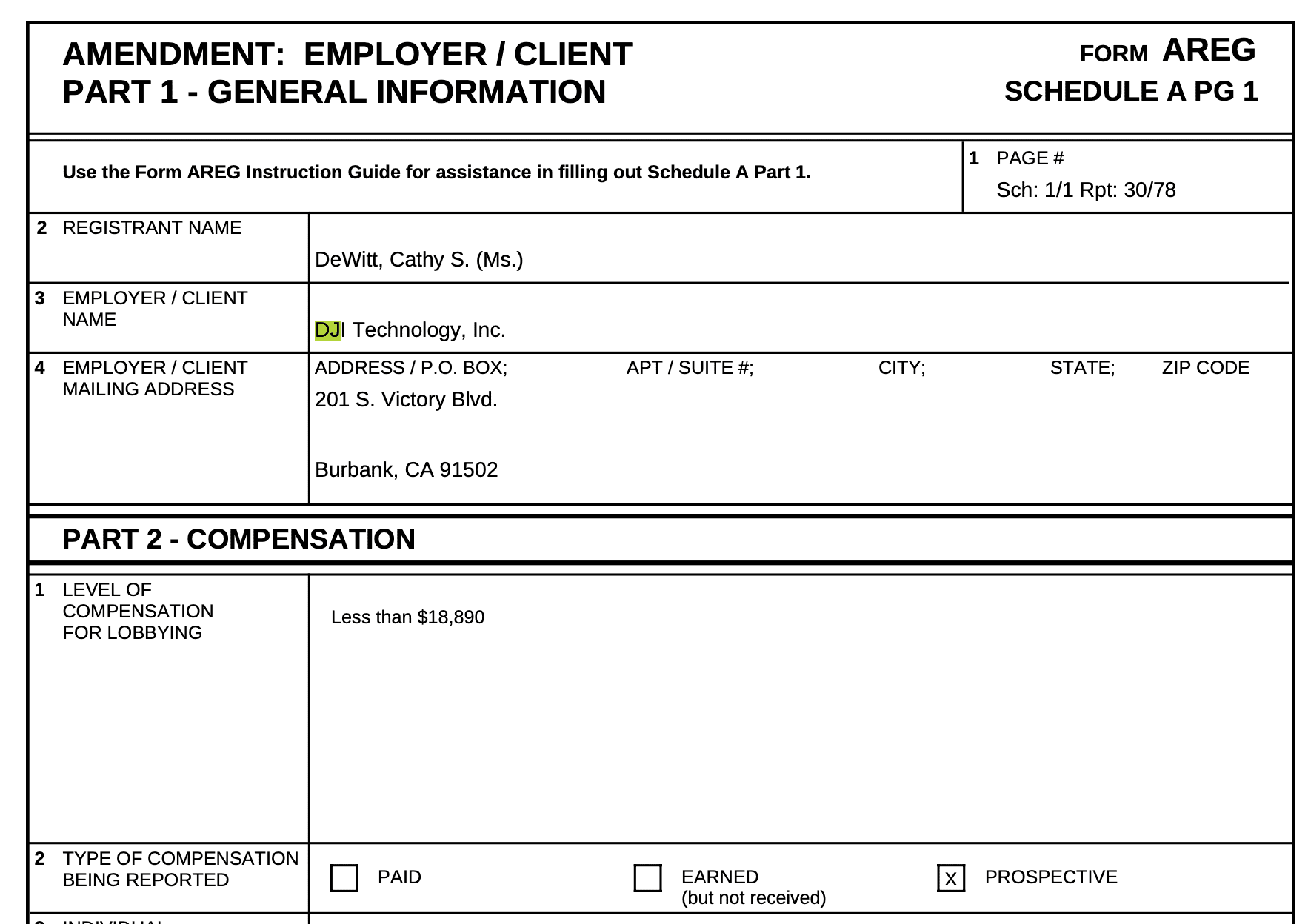
Source: Texas Ethics Commission
Then, Stan Schlueter:
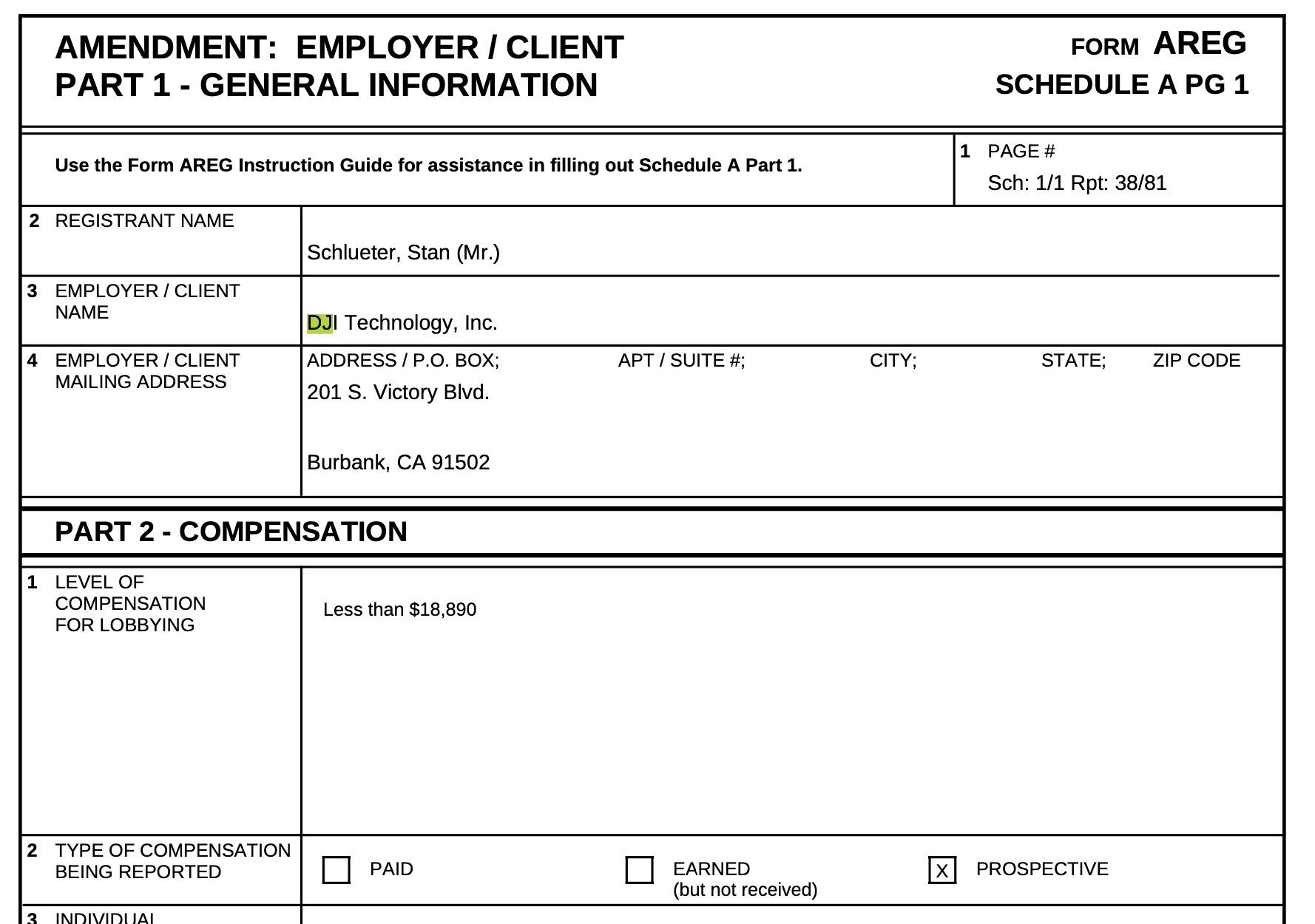
Source: Texas Ethics Commission
Finally, Brad Schlueter:
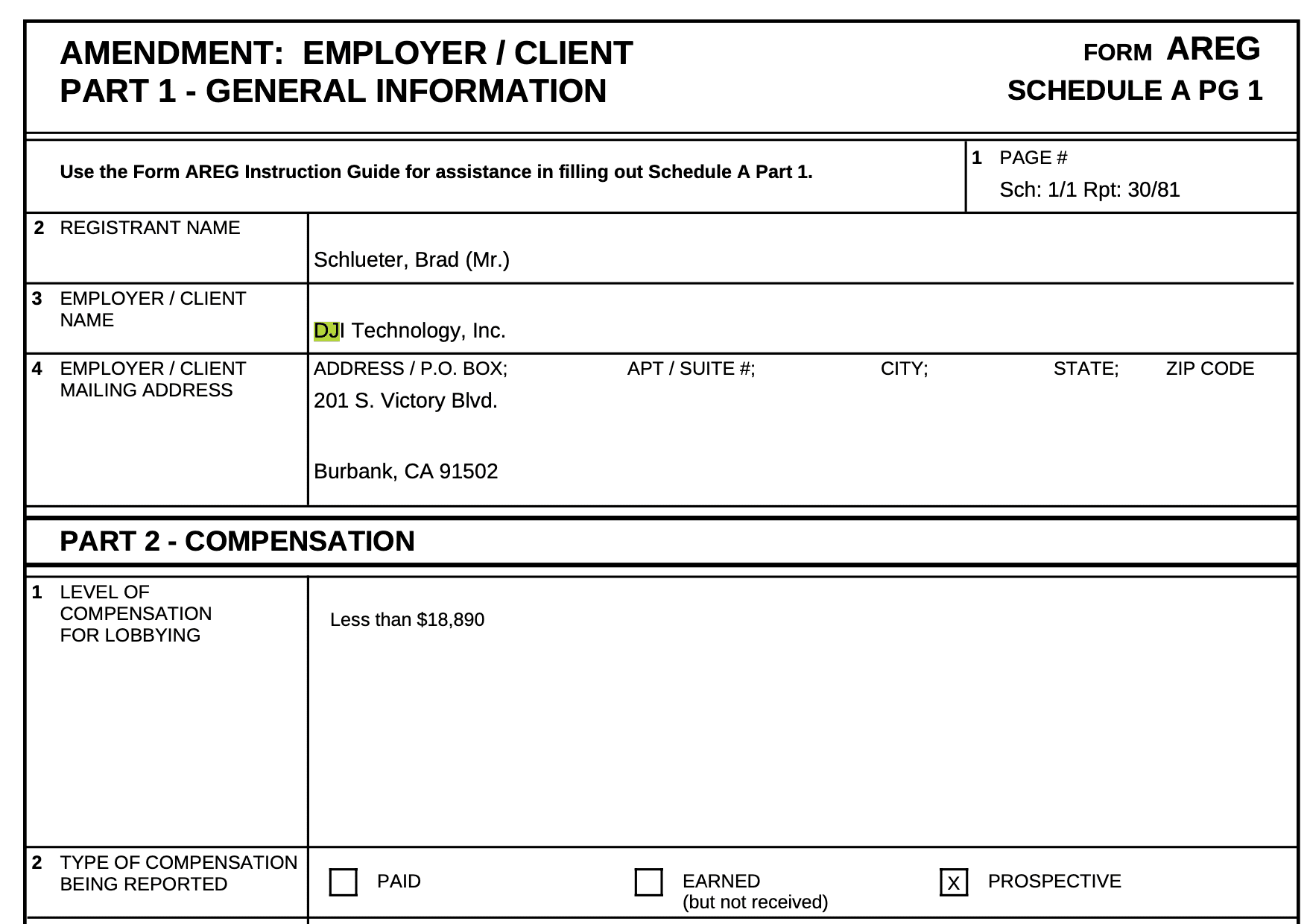
Source: Texas Ethics Commission
The filings also reveal Lu Da and Wang Di as DJI’s corporate officers or board members. This is from DeWitt’s filing, which matches the information in those of Brad and Stan Schlueter.
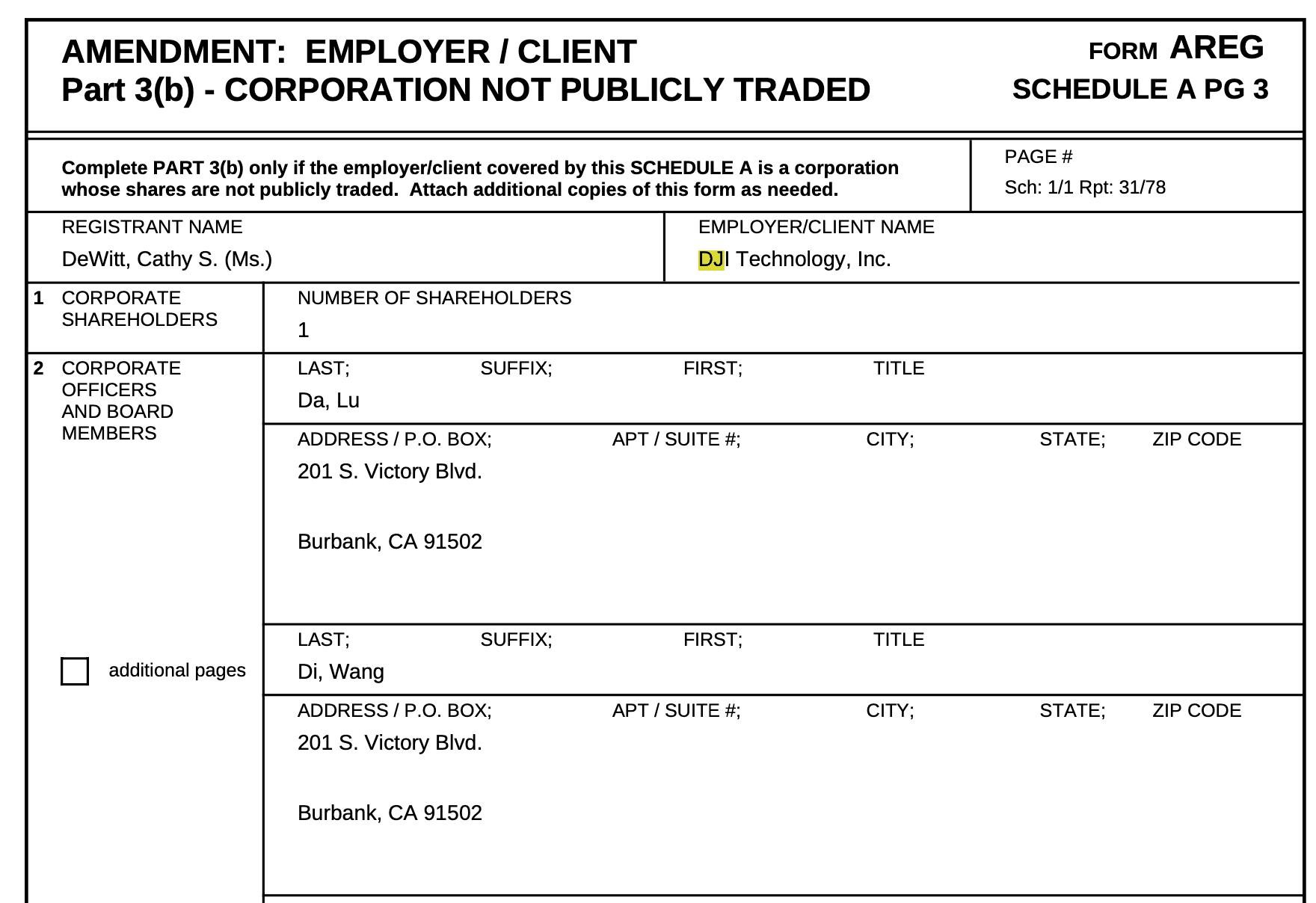
Source: Texas Ethics Commission
On August 5, in response to our open records request, the Texas Ethics Commission also provided amendments that DeWitt, Brad, and Stan Schlueter made to their filings the day before, removing DJI as a prospective client.

Source: Texas Ethics Commission

Source: Texas Ethics Commission

Source: Texas Ethics Commission
The Fight is On
Despite this change, the CCP is not known for giving up easily, as is evidenced with their rebranding strategies in education.
Regardless, Tinderholt is determined to stop their drone surveillance efforts in the 2023 legislative session. “They’re not going to pass it. I will do everything possible,” he told Texas Scorecard. “Are we really going to try to pass bills that are going to help our adversaries, or are we to [going] try to pass bills to push drones that are made by friendly countries or in America to do these types of things?”
Tinderholt points out Texans must involve themselves if they want to stop the CCP’s drone surveillance of the Lone Star State. “Start contacting your state and local officials and inquiring are they using DJI drones, and if so, do they have any plans to get rid of them? Or do they know what DJI is doing in regards to the Chinese government?”
In Part 3 of this series, we will explore the connections between a high-profile political family and an organization with ties to the CCP.
This article was updated to correct that Guangdong is the name of the Chinese province DJI is based in, and Shenzhen is the city.




